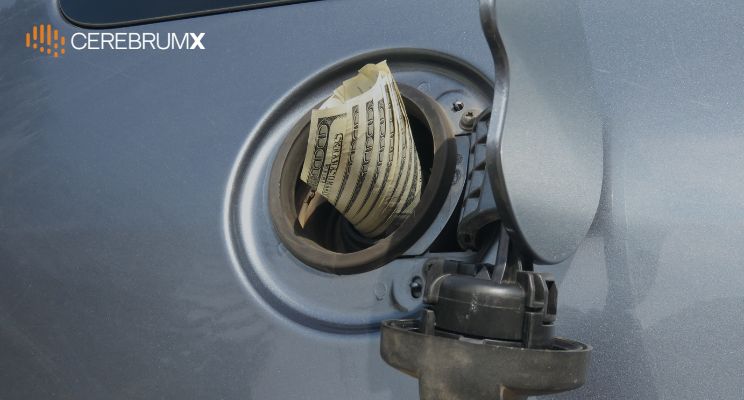Fuel expenses are among the most significant operating costs for fleet businesses, often accounting for a large portion of total expenditures. While fuel price fluctuations are inevitable, excessive fuel consumption due to poor management practices is avoidable. Without proper oversight, fleets not only lose money but also experience operational inefficiencies that impact overall profitability.
By leveraging connected vehicle data, fleet managers can identify key areas of fuel waste and take proactive steps to optimize fuel usage. We explore five major reasons why fleets consume more fuel than necessary and how embedded data solutions help mitigate these inefficiencies.
Excessive Idling: The Silent Fuel Drainer
Idling may seem insignificant on an individual vehicle level, but across an entire fleet, the impact is substantial. When trucks, vans, or company vehicles remain running while stationary—whether during loading, at stoplights, or in traffic—fuel is wasted without any productivity in return. A single hour of idling can burn up to a gallon of fuel. Over time, excessive idling can even lead to increased engine wear, and subsequently higher maintenance costs.
With real-time tracking and driver behavior monitoring, fleet managers can identify idling patterns across their vehicles. Automated alerts and data-driven reports help implement idling reduction policies, ensuring drivers cut down unnecessary engine runtime and conserve fuel.
Inefficient Fueling Strategies: Unplanned and Costly
Without a structured fueling strategy, fleets often experience unnecessary expenses due to inconsistent refueling habits. Drivers may choose refueling stations based on convenience rather than cost-effectiveness, leading to higher expenses. Additionally, unpredictable fuel stops disrupt optimized routes, causing inefficiencies. Fuel price differences between stations can lead to significant annual overspending. Extra miles traveled to reach fuel stations add to fuel consumption and operational inefficiencies.
Fleet managers can integrate fuel card data with telematics insights to analyze when and where vehicles are refueling. Route optimization features also help in identifying the most cost-effective fuel stops along planned routes. By leveraging real-time fuel price tracking, fleets can ensure that refueling occurs at the lowest-cost locations, reducing overall expenses.
Skipping Maintenance Schedules: A Costly Oversight
Fuel efficiency is directly linked to regular vehicle upkeep, yet many fleets fail to adhere to structured maintenance schedules. When routine checks are delayed or skipped, minor issues—such as low tire pressure, clogged air filters, or engine inefficiencies—can gradually escalate, leading to unnecessary fuel consumption and increased wear and tear. Underinflated tires alone can reduce fuel efficiency by up to 3%, increasing fuel costs across the fleet. A poorly maintained engine consumes more fuel and emits higher levels of pollutants, impacting both costs and sustainability efforts.
By leveraging real-time vehicle diagnostics, fleet managers can stay ahead of maintenance needs. Embedded data solutions provide instant alerts for issues like tire pressure drops, engine faults, and other key performance indicators. Proactive maintenance scheduling, powered by predictive analytics, helps reduce fuel waste, prevent unexpected breakdowns, and extend vehicle lifespan.
Poor Route Planning: Taking the Long Way Around
Unoptimized routes leads to increased mileage, more fuel consumption, and higher operational costs. When vehicles take inefficient routes or experience frequent detours due to poor planning, unnecessary fuel is burned. Extra miles mean more fuel spent and increased wear on vehicles. Traffic congestion further leads to extended engine run time and additional fuel waste.
Advanced fleet tracking solutions provide real-time GPS data to optimize routing, ensuring vehicles take the most fuel-efficient paths. AI-powered route planning can also factor in traffic conditions, road restrictions, and fuel stops to further reduce unnecessary fuel consumption.
Inconsistent Driver Behavior: The Human Factor in Fuel Waste
Aggressive driving behaviors—such as harsh acceleration, speeding, and sudden braking—significantly contribute to increased fuel consumption. Drivers who operate vehicles inefficiently can unknowingly cost fleets thousands of dollars in wasted fuel annually. Harsh acceleration and speeding can decrease fuel efficiency by up to 30%, while, frequent braking and erratic driving behavior can lead to excessive fuel consumption and higher maintenance costs.
By utilizing driver monitoring systems and AI-powered analytics, fleet managers can assess driving patterns in real time. Telematics solutions provide detailed insights into fuel-wasting behaviors, allowing managers to implement training programs that encourage fuel-efficient driving habits.
Electric Fleets: The New Way to Tackle Fuel Costs
With fuel expenses becoming a persistent challenge, electric vehicles (EVs) present an optimal alternative for fleets looking to control costs and enhance efficiency. Unlike traditional fuel-powered vehicles, EVs eliminate direct fuel expenditures and significantly reduce maintenance costs due to their simpler drive-train and fewer moving parts. Beyond financial savings, EV adoption also aligns with sustainability initiatives by drastically lowering carbon emissions, making it a forward-thinking choice for modern fleet operations.
Additionally, leveraging connected vehicle data allows fleet managers to optimize EV performance through intelligent charging strategies. Smart data-driven insights enable better scheduling of charging cycles, reducing electricity costs while maximizing battery efficiency and longevity. By integrating EVs with real-time fleet data solutions, businesses can achieve greater cost stability, improved operational efficiency, and a reduced environmental footprint—making the shift toward electric fleets a strategic move for the future.
In Conclusion
Fuel waste is an ongoing challenge for fleets, but with the right technology, businesses can take control of their fuel expenses and drive greater efficiency. Connected vehicle data provides actionable insights into fuel consumption patterns, helping fleet managers reduce idle time, optimize fueling, improve maintenance practices, and enhance driver behavior.
With fuel costs continuously impacting profitability, now is the time to leverage data-driven fleet management strategies. Are you ready to cut fuel expenses and improve operational efficiency? Investing in the right connected vehicle solutions is the key to long-term success.

